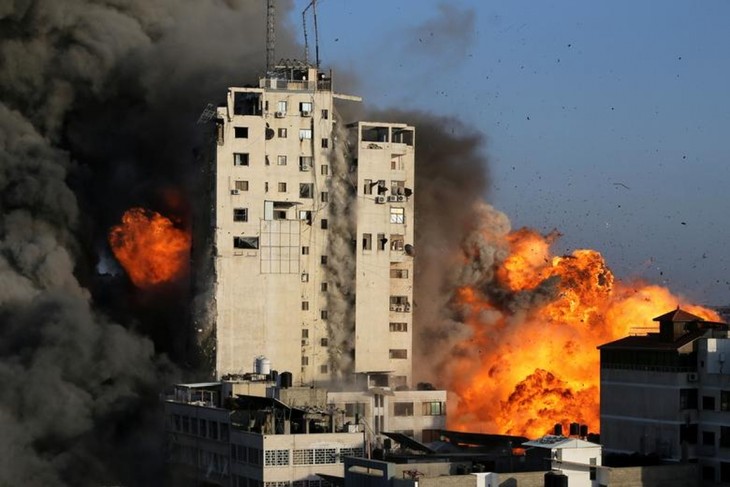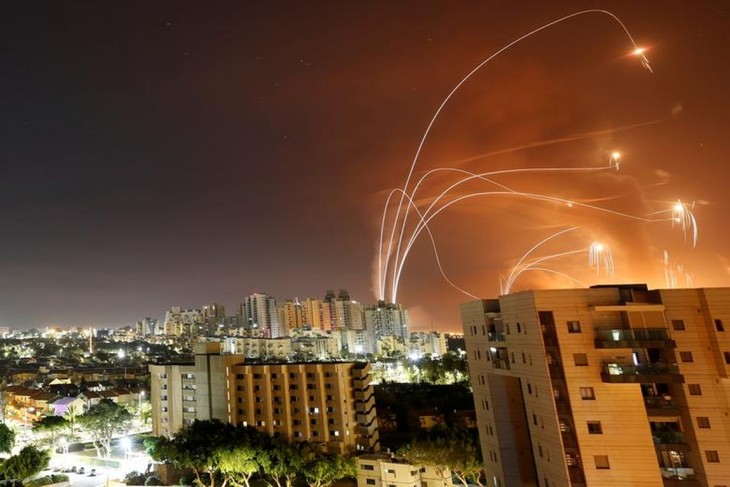(VOVWORLD) - The Gaza Strip has for the past few days been engulfed in flames from air strikes and rocket attacks as fighting between Israel and Hamas sparks fear of an all-out war.
 High-rise buildings in the Gaza Strip are attacked by Israel, May 12, 2021. Photo: Reuters High-rise buildings in the Gaza Strip are attacked by Israel, May 12, 2021. Photo: Reuters
|
Fresh tensions
This military clash, the most intense since the 2014 war between Israel and Palestine in the Gaza Strip, stems from the Israeli government’s eviction of Palestinian families from East Jerusalem’s Sheikh Jarrah area. Angry Palestinians gathered outside the buildings Jews had just moved into. Clashes broke out and Hamas, the Palestinian militia group in the Gaza Strip, seized the opportunity to consolidate its influence. In several statements on Monday, Hamas vowed to stand up for Palestinians whose land was confiscated and turn several Israeli cities, including Tel Aviv, into living hell.
Last Friday and Saturday night, Israeli police launched an operation at the Temple Mount in East Jerusalem during a Palestinian Muslim prayer session. Israeli security forces stormed the courtyard of the Al-Aqsa mosque, the third holiest Muslim mosque after Mecca and Madina, and fired tear gas grenades and rubber bullets at worshipers, including women and children. In retaliation, Palestinians thrown bricks and stones at the police and more than a thousand rockets were fired into Israel, targeting Tel Aviv and other cities. Israeli missiles struck back at more than 600 targets in the Gaza Strip. Gun battles have left severe damage on both sides. According to Israeli and Palestinian sources, nearly 100 people have been killed and nearly a thousand injured, most of them Palestinians.
 Israel's Iron Dome defense system intercepts rockets fired from the Gaza Strip, May 12, 2021. Photo: Reuters Israel's Iron Dome defense system intercepts rockets fired from the Gaza Strip, May 12, 2021. Photo: Reuters
|
The UN Security Council has convened three emergency sessions, at which UN chief Antonio Guterres and other world leaders strongly condemned attacks on civilians and called on Israel and Palestine to exercise restraint and avoid escalation.
Causes of the conflict
The Israel-Palestine conflict has gone on for decades, with Jerusalem as the focus, because both sides claim Jerusalem, now entirely under Israeli control, as their capital. The international legal status of Jerusalem has not been clearly defined. After the Six-Day War in 1967, Israel occupied East Jerusalem, including the Old City, and declared all of Jerusalem its capital, despite international objections at the time.
The UN Security Council has passed a resolution, calling Israel’s annexation of Jerusalem as its capital invalid, and has repeatedly reaffirmed this position. In 1988, the Palestinian State declared its establishment with Jerusalem as its capital. The Oslo peace treaty signed in 1993 by Palestine and Israel stipulates that both sides will negotiate and sign an agreement on the status of Jerusalem. 136 of 193 UN members recognize a Palestine State with Jerusalem as its capital.
The Israel-Palestine conflict is the longest and most complicated conflict in modern history. The Israeli government's eviction of Palestinians from parts of East Jerusalem in the past week, during the Muslim holy month of Ramadan, has exacerbated it. The "two states" are separated by an abyss of conflict that never ends.